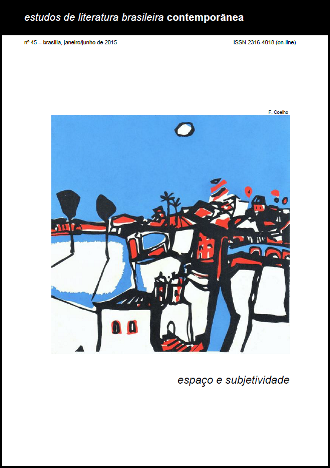Espaços ficcionalizados em Desterro, de Luis S. Krausz:
um ensaio em geografia literária
DOI:
https://doi.org/10.1590/2316-4018453Abstract
A maioria dos textos ficcionais pode ser localizada geograficamente, no que diz respeito a cenário e enredo, sendo que essas localizações são concebidas de múltiplas maneiras, entre a imaginária e a realista. A partir dessa premissa óbvia, analiso o romance contemporâneo Desterro: memórias em ruínas (2011), de Luis S. Krausz, que oferece uma copiosa presença de espaços reais ficcionalizados, embora em parte históricos. Através da análise, pretendo experimentar uma metodologia particular, desenvolvida recentemente sob a denominação “geografia literária”. Essa abordagem implica, primeiramente, em analisar tanto questões relevantes à relação entre texto e espaço quanto as várias formas de referenciar espaços geográficos (indicar, suprimir, anonimizar, transformar) e as funções narrativas atribuídas aos espaços ficcionalizados. Num segundo passo, e ainda de acordo com o método, os resultados serão sistematizados, comparados e apresentados por meio da geração de mapas, com o propósito de averiguar a potencialidade e as limitações da interpretação cartografada.
Downloads
References
KRAUSZ, Luis S. (2011). Desterro: memórias em ruínas. São Paulo: Tordesilhas.
MORETTI, Franco (1999). Atlas of the European novel 1800-1900. Londres; Nova York: Verso.
PIATTI, Barbara (2008). Die Geographie der Literatur: Schauplätze, Handlungsräume, Raumphantasien. Göttingen: Wallstein.
SELIGMANN-SILVA, Márcio (2011). Posfácio: a arte de testemunhar o desterro. In: KRAUSZ, Luis S. Desterro: memórias em ruínas. São Paulo: Tordesilhas.
WESTPHAL, Bertrand (2011). Geocriticism: real and fictional spaces. Tradução de Robert T. Tally. Nova York: Palgrave Macmillan.
WINK, Georg (2015). Topografias literárias e mapas mentais: a sugestão de espaços geográficos e sociais na literatura. In: DALCASTAGNÈ, Regina; AZEVEDO, Luciene. Espaços possíveis na literatura brasileira contemporânea. Porto Alegre: Zouk.
Downloads
Published
How to Cite
Issue
Section
License
Authors who publish in this journal agree to the following terms:
a) The authors maintain the copyright and grant the journal the right of first publication, the work being simultaneously licensed under the Creative Commons Attribution License-Non Commercial 4.0 which allows the sharing of the work with acknowledgment of the authorship of the work and publication this journal.
b) Authors are authorized to enter into additional contracts separately, for non-exclusive distribution of the version of the work published in this journal (eg publish in institutional repository or as a book chapter), with authorship recognition and publication in this journal.
c) Authors are allowed and encouraged to publish and distribute their work online (eg in institutional repositories or on their personal page) after the editorial process, as this can generate productive changes, as well as increase the impact and citation of published work (See The Effect of Free Access).
d) The authors of the approved works authorize the magazine to, after publication, transfer its content for reproduction in content crawlers, virtual libraries and the like.
e) The authors assume that the texts submitted to the publication are of their original creation, being fully responsible for their content in the event of possible opposition by third parties.


